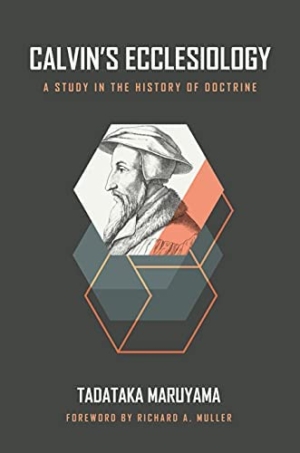The other things must be briefly dispatched; for otherwise we should never be able to get out of this forest. We shall merely mention a few of the alleged relics of saints who lived in the days of our Saviour, and then . . . Continue reading →
Calvin Studies
Calvin: Time For An Inventory (11)
Now let the Apostles come forward in order. Their number, however, may beget confusion; and, therefore, the better course will be to take Paul and Peter by themselves, and afterwards proceed to the rest. Their bodies are at Rome, half at St . . . Continue reading →
Calvin: Time For An Inventory (10)
To proceed in order, we must now consider the case of John the Baptist, who, according to the account given in the Gospel, that is, according to the truth of God, after being beheaded, was buried by his disciples. Theodoret relates that . . . Continue reading →
Calvin: Time For An Inventory (9)
With regard to the Virgin Mary, as they give out that her body is not on the earth, they are of course prevented from pretending to have her bones; were it otherwise, I can well believe they would have given her a . . . Continue reading →
Calvin: Time For An Inventory (8)
For to convince all men how little credit is due to the proofs which they adduce in support of their relics, it is to be observed, that the chief and most authentic of those which are seen at Rome are said to . . . Continue reading →
Calvin: Time For An Inventory (7)
In regard to the linen clothes in which our Saviour’s body was wrapped, I would, in like manner, ask how it comes, that while the Evangelists carefully enumerate the miracles which took place at the death of Christ, and omit nothing which . . . Continue reading →
Calvin: Time For An Inventory (6)
The next thing in order is the soldier’s spear. This ought to be one only, but perhaps, from having felt the fire of some alchymist, it has increased and multiplied. For four have come to light, besides those which exist in different . . . Continue reading →
Calvin: Time For An Inventory (5)
We come now to the principal relics of our Lord, viz., those connected with his sufferings and death. And, first, let us consider the case of the cross on which he was suspended. I know it is regarded as a certain fact, . . . Continue reading →
Calvin: Time For An Inventory (4)
Then they have the waterpots in which our Saviour turned the water into wine, when he was present at the marriage in Cana of Galilee. I would fain know who was their custodier all the time, and afterwards made presents of them. . . . Continue reading →
The Canons Of Dork #16 For May 6, 2023
Sometimes a doughnut is just a doughnut. Continue reading →
Calvin: Time For An Inventory (3)
Let us begin then with Christ. As his natural body could not be possessed, (though some have found an easy way of fabricating miraculous bodies for him, in whatever numbers, and with whatever frequency they please,) instead of it they have collected . . . Continue reading →
Calvin: Time for An Inventory (2)
The duty of Christians was, to leave the bodies of saints in their tombs in obedience to the universal sentence by which it is declared, that man is dust, and to dust will return; not to raise them up in sumptuousness and . . . Continue reading →
Calvin: Time for an Inventory (1)
Augustine, in his work, entitled, On the Labour of Monks, complaining of certain itinerant impostors, who, as early as his day, plied a vile and sordid traffic, by carrying the relics of martyrs about from place to place, adds, “If, indeed, they . . . Continue reading →
The Canons Of Dork #15 For April 1, 2023
“Memories…Misty Water Colored Memories” Continue reading →
Heidelminicast: Godfrey On Why Calvin Rejected Theonomy (3)
Bob Godfrey explains why Calvin wasn’t a theonomist. Continue reading →
Heidelminicast: Godfrey On Why Calvin Rejected Theonomy (2)
All the Episodes of the Heidelcast Subscribe to the Heidelcast! On Twitter @Heidelcast How To Support Heidelmedia: use the donate button below Subscribe in Apple Podcast Subscribe directly via RSS New Way To Call The Heidelphone: Voice Memo On Your Phone The . . . Continue reading →
Review of Tadataka Maruyama, Calvin’s Ecclesiology: A Study in the History of Doctrine
There are too many treatments of particular aspects of John Calvin’s theology. The proliferation of books and articles of course relates to Calvin’s large and varied writing corpus as well as his ongoing popularity, especially growing throughout the twentieth century. The problem . . . Continue reading →
Heidelminicast: Muller—Calvin Taught An Ordo Salutis
These are some of our favorite Heidelquotes. Something to think about from the Heidelcast. If you are subscribed to the Heidelcast or the Heidelblog (see below) you will receive these episodes automatically. All the Episodes of the Heidelcast How To Subscribe To Heidelmedia . . . Continue reading →
Heidelminicast—Calvin On The Two Ways Of Being In The One Covenant Of Grace
These are some of our favorite Heidelquotes. Something to think about from the Heidelcast. If you are subscribed to the Heidelcast or the Heidelblog (see below) you will receive these episodes automatically. All the Episodes of the Heidelcast How To Subscribe To Heidelmedia . . . Continue reading →
Heidelminicast: Tadaka Maruyama On Calvin’s Response To The Anabaptists
These are some of our favorite Heidelquotes. Something to think about from the Heidelcast. If you are subscribed to the Heidelcast or the Heidelblog (see below) you will receive these episodes automatically. Heidelminicast Series: Contra Postmillennialism All the Episodes of the Heidelcast How . . . Continue reading →



